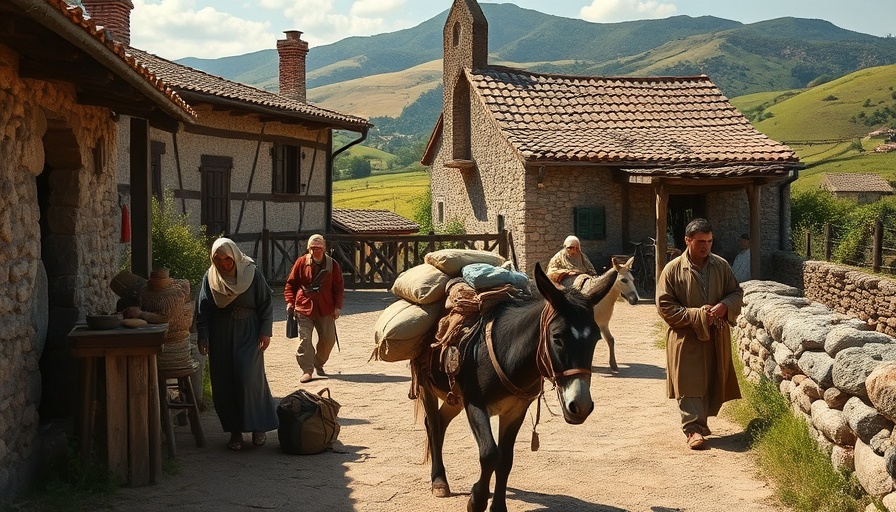
The Timeless Tragedy of Jean de Florette
Claude Berri’s 1986 adaptation of Marcel Pagnol’s Jean de Florette unveils a heart-wrenching narrative tucked away in the picturesque hills of Provence. This evocative film deftly intertwines themes of greed, exploitation, and the harsh realities of rural life, elements that remain strikingly pertinent in today's society. Audiences more than three decades later can resonate with the film's warnings of manipulation and the destruction of innocence.
A Dreamer’s Downfall
The film introduces us to César Soubeyran, affectionately nicknamed Le Papet (played by Yves Montand), and his nephew Ugolin (Daniel Auteuil). These characters embody desperation and aspiration, fixated on acquiring a neighboring farm with a concealed spring. Ugolin dreams of cultivating lucrative carnations but is hindered by the absence of water. Rather than invest in what is rightfully theirs, Le Papet and Ugolin resort to sabotage, sealing the spring to await the failure of the new landowner.
Enter Jean de Florette (Gérard Depardieu)—a hunchbacked city man, an idealist full of dreams who seeks to escape urban life and cultivate his own paradise with his family. Armed with plans and hope, Jean is oblivious to the nefarious plots orchestrated by those he believes to be friends. As the sun-soaked days turn to drought and despair floods in, the tension escalates. The emotional climax is a slow, painful unraveling, emphasizing the cruelty that can surface even in pastoral settings.
Character Study: The Depth of Humanity
Jean embodies a poignant character arc, transitioning from hopeful to beaten, serving as the heart and moral backbone of the film. His optimistic ideals clash sharply against the harsh truths of human cruelty. Ugolin, displaying both eagerness and weakness, is caught between ambition and guilt, reflecting the internal conflict many face when weighed down by choices.
At the film’s core lies Le Papet, a ruler of shadows, whose quiet manipulation drives this narrative. His eventual regret is a testament to the repercussions of one’s actions, albeit too late for Jean. The presence of Jean’s family, particularly his daughter Manon, elevates the emotional stakes, setting the stage for a sequel that further explores these themes.
Reflections on Contemporary Life
What makes Jean de Florette so resonant today is its insightful analysis of systems rigged against outsiders, mirroring modern challenges in our communities. As Jean faces obstacles hidden beneath the surface, audiences can relate to their own battles with bureaucratic hurdles, economic restrictions, and societal barriers. The blocked spring symbolizes not just a denial of water, but a broader commentary on opportunity and the silent force of selfishness.
Cinematic Beauty and Music
The film is more than just a story; it is a visual and auditory experience. With its stunning cinematography capturing the beauty of Provence and a score inspired by Verdi, the film enchants while portraying profound sadness. It’s a reminder that tragedy often unfolds discreetly, hidden beneath layers of daily life.
A Lesson in Humanity
As we reflect on the film and its implications, it’s apparent that the narrative teaches us about human interaction and empathy. The betrayal and struggle faced by Jean dares us to examine how we treat others in our own communities, especially the vulnerable who strive against adversity.
Encouraging Local Reflections
In Dallas, where community ties are often celebrated, it’s valuable to draw parallels from films like Jean de Florette. The caring spirit of grassroots initiatives and local gatherings can counteract the isolation that modern dynamics create. And as we think about ongoing events in Dallas—concerts, fairs, and festivals—let these instances remind us of the strength found in unity and the importance of supporting one another, ensuring that no one is left in the silence of despair.
Through community celebrations and support systems, we can foster a richer narrative where each individual plays a part in nurturing hope and opportunity, much like Jean de Florette envisioned.
Get Involved!
As these themes resonate, we encourage you to seek out and participate in local Dallas events that celebrate music, culture, and community. Understanding the importance of connection not only produces lasting memories but empowers the spirit of togetherness that echoes throughout our lives. Engage with your surroundings, be it through art, music, or simply being present in conversations with neighbors, and help create a more vibrant Dallas.
 Add Element
Add Element  Add Row
Add Row 



Write A Comment